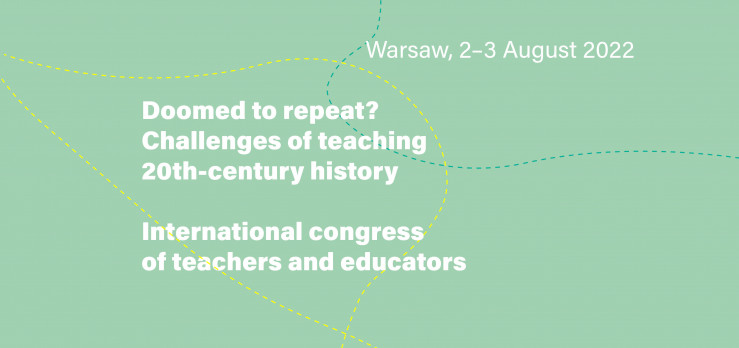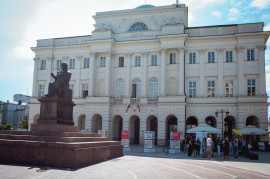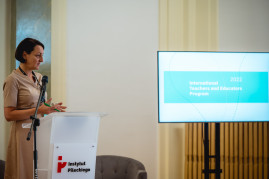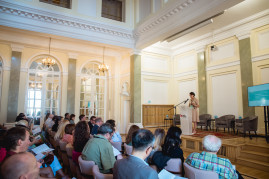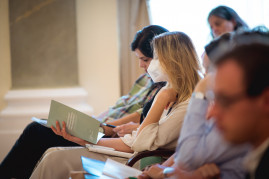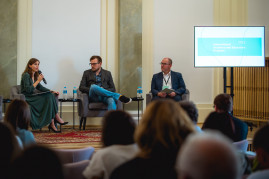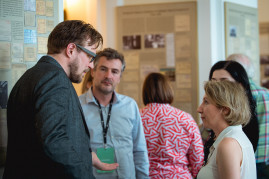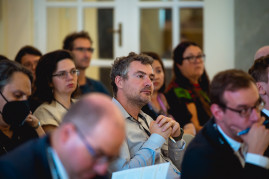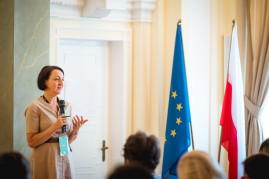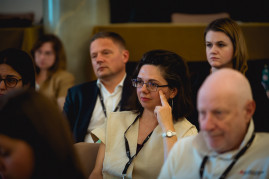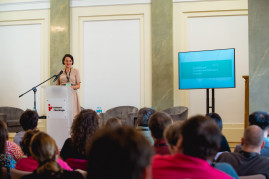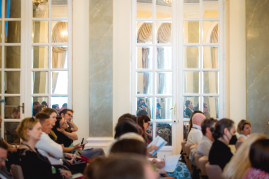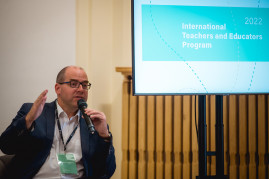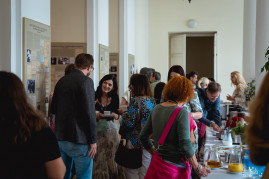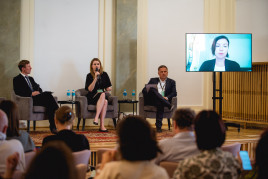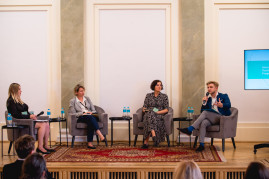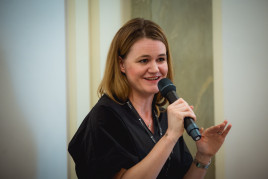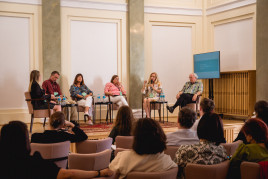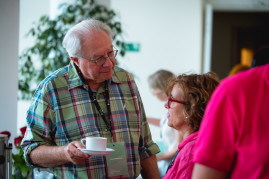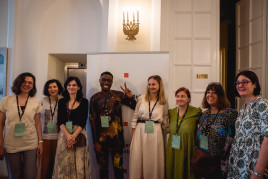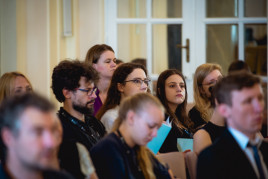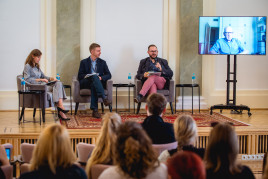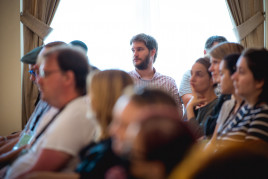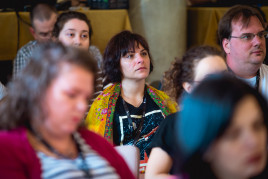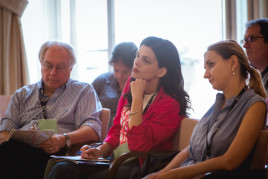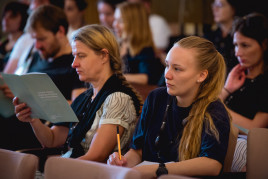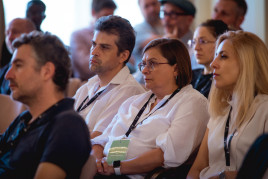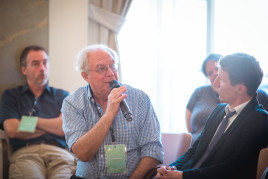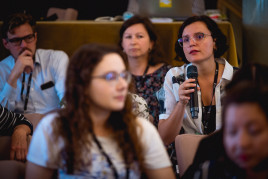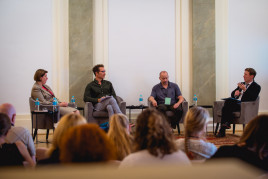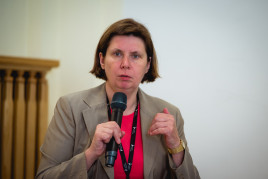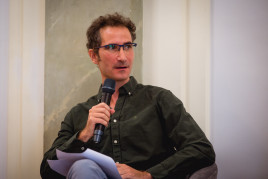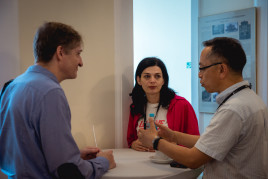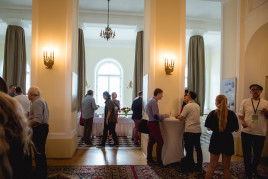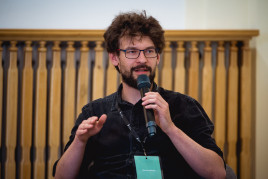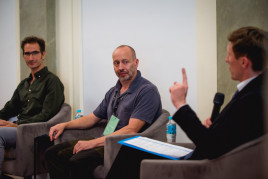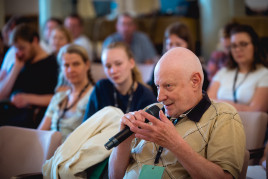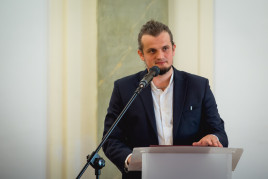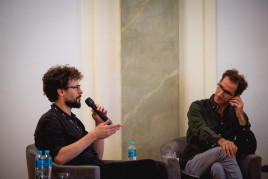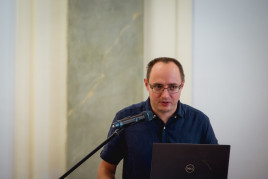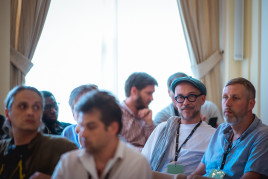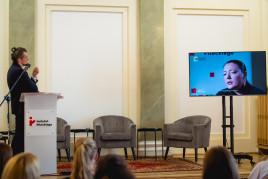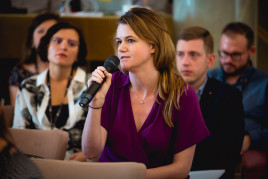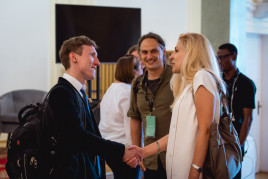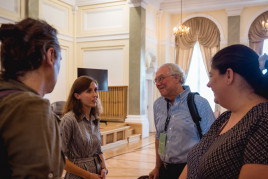The congress confronted various perspectives and methodological approaches, as well as to exchange experiences with historical education practitioners from many countries. Academics, teachers, and representatives of institutions and non-governmental organizations active in the field of memory have been invited to participate in discussion panels.
The following issues were discussed:
- Multiperspectivity – national and transnational approaches to the past;
- Differences in teaching communism between the countries of the West and the countries of the former Eastern bloc;
- History as a propaganda tool in light of Russia’s attack on Ukraine;
- The role of historical education in the processes of reconciliation between nations;
- Teaching the history of totalitarian regimes as a civic education tool.
Place: the Mirror Room of the Staszic Palace on Krakowskie Przedmieście, on August 2-3.
Doomed to Repeat?Challenges of Teaching 20th-Century History International congress on history education
10:00 - 11:00 Keynote lecture - prof. Magdalena Gawin
11:15–12:45 Multiperspectivity. National and transnational approach to the Past.
Multiperspectivity has been a key postulate in European history education for more than 25 years. What is a multiperspective approach in practice? What opportunities does such an approach provide, and what are the dangers? What kind of perspectives should we take into account, and what criteria should we use to select them? Are there any that we should not consider?
Panel discussion: Aurora Ailincai, Wojciech Kozłowski, Steven Stegers.
Aurora Ailincai, after finishing her Master’s Degree in Political Sciences and European Studies at Sorbonne University in Paris, Ms Aurora Ailincai joined the Council of Europe in 2003 within the Directorate of Education, where she was responsible for activities related to inclusive intercultural education. Between 2008 and 2010, in the context of the education reform in Kosovo, she was responsible for inclusive education activities for Ashkali, Roma and Egyptian minorities. From 2010 to 2020, she was Head of the Strategic Partnerships Unit and Deputy Head of Division within the Roma and Travellers Team of the Council of Europe. During this time Ms Ailincai co-ordinated several pan-European programmes focusing on: local governance and active citizenship; promotion of inclusive education; teaching Roma and Traveller history; and the Remembrance of the Roma Holocaust. Since April 2021 she has been the Executive Director of the Observatory on History Teaching in Europe. Ms Ailincai has a PhD in educational sciences from the University of Strasbourg and her PhD research focused on school mediation and related challenges in view of existing inequalities and structural barriers in the education system. Her areas of research focus on policies and practices in education, school and cultural mediation, as well as inclusive education. In February 2020 she successfully completed the Oxford Women's Leadership Development Programme, in Saïd Business School, University of Oxford. Since 2009, Ms Ailincai has been a visiting lecturer in several universities - such as the University of the West Indies and Guyana and the University of French Polynesia - where she has been teaching programme design in multi-ethnic and multi-cultural contexts, as well as the creation of networks and partnerships.
Wojciech Kozłowski - PhD, is the deputy director of the Pilecki Institute, a research institution based in Warsaw, and the chief editor of its scholarly journal "Totalitarian and 20th Century Studies". He holds Ph.D. in medieval studies from Central European University and M.A. in history from the University of Warsaw. He was a fellow at the New Europe College and a visiting scholar at the Department of History at Harvard University
Steven Stegers is the Executive Director of EuroClio – European Association of History Educators. At EuroClio, he has developed and coordinated international projects to enhance history and citizenship education since 2006. He has been an advisor for the Council of Europe, the Global Centre for Pluralism, the European Commission, KAICIID Dialogue Centre, the OSCE HCNM and the International Baccalaureate. He has coordinated the development of the award winning Historiana platform, which is designed for and with educators to promote quality history, heritage and citizenship education. More than 300 people from over 30 countries contributed to its development so far.
13:00–14:30 Long Shadow of the Iron Curtain. Teaching about communism in the West and the East.
The post-war division of the globe left its mark on Europe's societies. Just one example is how perception of Communism differs in the East and the West. We will examine how these differences make themselves known in history education. Can western nations, who did not experience the Communist system, learn something from the countries of the former Eastern Bloc?
Panel discussion: Milda Mataciunaite-Boyce, Dorrotya Baczoni, Rafał Rogulski.
Milda Mataciunaite-Boyce is Director of Fellowship Programs at the Victims of Communism Memorial Foundation (VOC), where she leads VOC’s fellowship programs, engaging and supporting research scholars and emerging experts in the fields dedicated to work related to the history of communism, post-communist transition, and the legacy and impact of communism in current affairs. Previously Ms. Boyce served as Director of Transatlantic Leadership at the Center for European Policy Analysis (CEPA). Ms. Boyce holds a bachelor’s degree in Political Science and a Minor in Russian language from the University of Tennessee with a focus on International Relations. She studied communications and information science at Vilnius University, Lithuania. Previously, she worked at the Embassy of the Republic of Lithuania in Washington, DC.
Dorrotya Baczoni received her B.A. degrees in History and French from Eötvös Loránd University in 2012 and in International Studies from Corvinus University of Budapest in 2013, respectively. She graduated with an M.A. in History with a Modern Hungarian History specialization from Eötvös Loránd University in 2014. She is currently a PhD student at the same institution. She started working in the House of Terror Museum in 2009, where she was team leading historian between 2014 and 2016. From 2017 to 2018, she was Head of Content Development at a private company, and between 2018 and 2019 Head of the Department for Strategic Planning and Analysis in the Ministry of Foreign Affairs and Trade of Hungary. In 2019 she returned to the House of Terror Museum and since March 2021 she is the director of the The Institute of the Twentieth Century, which cooperates closely with the House of Terror Museum and is under the management of the same foundation.
Rafał Rogulski studied cultural and political science at the Universities of Wrocław and Marburg, and participated in the Executive MBA programme at the Polish Academy of Sciences in Warsaw. He was an assistant and then an advisor to Professor Władysław Bartoszewski, first at the Polish Robert Schuman Foundation and the Ministry of Foreign Affairs (1998–2001), and later at the Chancellery of the Prime Minister of Poland (2008–12). From 2001 to 2005 he was secretary of the Culture Department at the Polish Embassy in Berlin. In the late 1990s Rogulski worked as a journalist for the daily Życie (Life) and the bimonthly journal Europa. In 2010, Ministers Tomasz Merta and Andrzej Przewoźnik entrusted him with the creation and management of the ENRS Secretariat, which in 2015 became the Institute of European Network Remembrance and Solidarity.
15:30–17:00 History as a tool of propaganda. Russia, Ukraine and the West.
References to history in today’s political discourse arouse strong emotion
and controversy more than ever before. History has long been used as a
justification for violence and aggression. Can history education counteract
the abuses of propaganda?
Panel discussion: Joanna Urbanek, Bartłomiej Gajos, Hanna Chernenko.
Joanna Urbanek is a historian and psychologist, interested in the social and political history of the 20th century, especially in the First and the Second World War and the history of war traumas. Curator at the House of European History in Brussels (a project of the European Parliament), since 2016 involved in the development of the museum project. Lead curator and the project manager of the exhibition Fake for Real. A History of Forgery and Falsification (Brussels, 2020-2022). Author of Everyday Life in the Shadow of Terror. German Occupation in Poland 1939-1945 (Gdańsk 2015) and Lęk i strach. Warszawiacy wobec zagrożeń Września 1939 r. [Fear and Anxiety: Civilian Population of Warsaw in September 1939] (Warsaw 2009). Member of the Memory Studies Association and the Polish Oral History Association (Polskie Towarzystwo Historii Mówionej).
Bartłomiej Gajos - Research Fellow at the Mieroszewski Centre. He’s currently working on his book ‘Memory and Revolution. The Politics of Memory of the Bolshevik Regime, 1917–1920.
Hanna Chernenko - Associate Professor at the Department of Ukrainian and Russian as Foreign Languages, Educational and Scientific Institute of Philology, Taras Shevchenko National University of Kyiv.
17:15–18:45 The role of history education: what to think or how to think?
What should modern history education teach? Certainly, factual knowledge
is within everyone's reach, but does this accessibility translate into knowledge of history? How should we teach history in the age of the internet
and universal access to knowledge?
Round table with Pilecki Institut International Teacher and Educators Program members: Lowell Blackman, Emma Abate, Ute Aeckerman, Don Jenkins, Tahmina Aslanova.
9:00–10:30 Forgiveness based on truth: reconciliation through school education.
History can be an obstacle in relations between states. Events of the past
influence perceptions of other nations. How can history education contribute
to reconciliation? Is it possible to overcome barriers related to a difficult past
and to forgive wrongs through education?
Panel discussion: Alexander Kliymuk, Eyal Naveh, Daniel Freudenreich.
Alexander Kliymuk, born 1991 in Tartu, Estonia. Studied at the universities of Berlin, Bremen, Kraków and St. Petersburg. From 2016 to 2020 freelance educator at the museums and memorials in Berlin and Brandenburg area, e.g. House of the Wannsee Conference, Memorial to the Murdered Jews of Europe and Leistikowstraße Potsdam. In 2019-2020 visiting lecturer at the University of Potsdam. Since 2020 head of the Educational department at the Pilecki Institute Berlin. Co-curator of the exhibition “Delivered. The Scout Mail in the Warsaw Uprising of 1944” (Pilecki Institute Berlin, 2022).
Daniel Freudenreich is a high school teacher at Karl-Liebknecht-Gymnasium in Frankfurt (Oder), a German border town to Poland. As the head of history department, he is responsible for historical curriculum, implementation of the CLIL-based school trial “Bilingual Learning in German and Polish” as well for coordination of teaching and learning for students in year 12 to 18. He graduated in Educational Science, History, German and Polish language at Potsdam University in 2018.
10:45–12:15 History of Nazism as a tool of civic education. Opportunities and limits.
The history of Nazism is an important point of reference for history education. The history of the Third Reich is crucial for understanding how a democratic system can collapse, and teaching about these issues is important for civic education. To what extent can examples from the past be used to help us understand contemporary political and social processes? What are the limits to this kind of thinking?
Panel discussion: Sebastian Gerhardt, Monika Krawczyk, Dr. András Lénárt.
Sebastian Gerhardt is working as freelanced educator in Berlin museums and exhibitions like the Topography of Terror and the Museum Karlshorst. Starting 20 years ago he developed educational programs on Nazi politics with focus on the occupational regimes in Second World War. He realized these programs with different groups - students from schools or universities, professionals in care work or military and police - from many countries.
Monika Krawczyk, an attorney by profession, and a current member of the Board of the Jewish Community in Poland. She is the former CEO of the Foundation for the Preservation of Jewish Heritage in Poland (2004-2019) and served in Boards of several institutions responsible for preservation of cultural heritage in Poland. She is an author of several academic publications (under the auspices of Jewish Historical Institute in Warsaw and Yad Vashem in Jerusalem) and many articles on Jewish and Holocaust.
András Lenárt is researcher at the Holocaust Memorial Center in Budapest. He was Visiting Fellow at IWM, Institute for Human Studies in Vienna (2021) and at the US Holocaust Memorial and Museum in Washington DC (2018). Dr. Lénárt holds a PhD in Economic and Social History, as well as three MA degrees (in History, Spanish and Sociology) from ELTE University Budapest. As the recipient of several fellowships throughout his academic career, Dr. Lénárt is likewise the author of numerous articles and book chapters. Some of his publications include, “Mass Murderers in Plain Clothes: The Life of Arrow Cross Party Members”, (2014), “The Legacy of World War II and Belated Justice in the Hungarian Films of the early Kádár Era”, (2016), and “Dismay in the Jewish Community. Metamorphosis of Jews and their representative bodies”, (2020). His most current chapter, “Jews in Photos, 1945 +/- 3 years,” is going to be published in the volume “Where do we go from here? Jewish families in Hungary after WWII”, edited by him, this year. He is lecturer at Budapest University of Jewish Studies, and was the coordinator of “Yellow-Star Houses in Budapest” project organised by CEU’s Open Society Archives and editor of the website
www.csillagoshazak.hu /
www.yellowstarhouses.org/. Dr. Lénárt is also the editor in chief of Holokausztfoto.hu website dedicated to the photos.
13:00- 13:30 „Poland in the Face of Totalitarianism”. Digital Projects of the Pilecki Institute (Department of Archives) - presentation
13:30 - 15:30 - break
15:30–16:00 Genocide - a recurring crime Presentation (Lemkin Center)
16:00–16:30 closing remark
